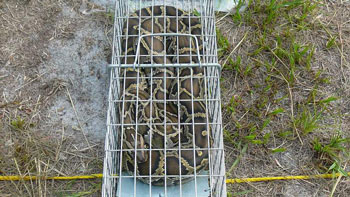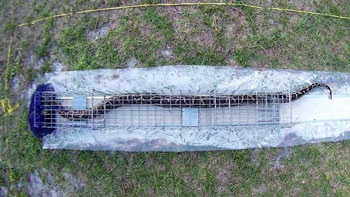The department has patented the snake trap design and is placing them in the Florida Everglades.
The U.S. Department of Agriculture has patented a snake trap designed to capture Burmese pythons in the Florida Everglades or anywhere large snakes need to be captured. The department has been working on the trap, which looks like a long version of a trap used to capture coyotes in Southern California, and specifically designed it to capture the exotic snakes. It is a long, thin galvanized steel cage with a net at one end and two metal, door-like triggers that are sprung as the snake passes through the cage and into the net, effectively trapping the snake. The trap, which was developed in conjunction with Tomahawk Live Trap of Wisconsin was constructed to enable smaller snakes that are native to the Everglades to easily escape. Still in the testing phase, the trap will be baited with rats or other small mammals and will be camouflaged to resemble pipes and other hides in hopes that the python will be lured into entering.

. Photo by USDA
Burmese python trap

Photo by USDA
Burmese python trap showing two doors that must be triggered ensure capture.
U.S. wildlife officials have tried all kinds of devices to learn how to control the Burmese pythons in the Everglades, including radio tracking collars, snake sniffing dogs and even a python hunt this year, which resulted in the capture of just 68 snakes despite an entry of more than 1,500 snake hunters. The snake trap is but another tool in the arsenal of officials to get a handle on the large invasive snakes that now call the Everglades home.
Burmese pythons (Python molurus bivittatus) are native to India and Southeast Asia and have established themselves in Florida's Everglades National Park. The snake can grow to more than 20 feet in length and weigh more than 300 pounds. It is illegal to import this snake into the United States, and those that are in the United States must stay in the state that they currently are located as it is also illegal to transport them, viable eggs or sperm, or any hybrids of the snakes across state lines.
Want to Learn More?
18-foot Invasive Burmese Python Killed in Florida
Florida Python Challenge Nets 68 Burmese Pythons



